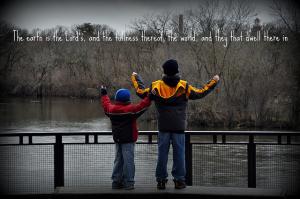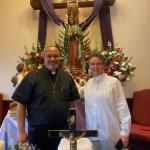What is “environmental repentance,” and how can preachers encourage congregations to envision the kind of transformation that brings about health and restoration for people and the planet?

Here are ideas for reading and preaching Psalm 72:1-7, 18-19 and Matthew 3:1-12, the story of John the Baptist calling people into “metanoia,” repentance. This is part of the EcoPreacher 1-2-3 series to equip preachers and congregations for engaging the Bible through an ecological lens. These texts are assigned as part of the Revised Common Lectionary for the Second Sunday of Advent in Year A.
Eco-Exegesis
Eco-exegesis is a method of interpreting the biblical text through a green lens using the principles of ecological theology.
Psalm 72:1-2
1 Give the king your justice, O God,
and your righteousness to a king’s son.
2 May he judge your people with righteousness,
and your poor with justice.
In his commentary on Psalm 72, William P. Brown, Professor of Old Testament at Columbia Theological Seminary explains that this prayer for the king’s reign is not just about longevity, prosperity, and international acclaim. The prayer is for him to “pay particular attention to the impoverished, granting them justice and salvation.” (Deep Calls to Deep: The Psalms in Dialogue Amid Disruption by William P. Brown [Nashville, TN: Abingdon Press, 2021, 269].) The message of Psalm 72 has profound implications for those who wield power in our own time: “power is to be exercised on behalf of the most vulnerable, whose welfare is the true measure of royal justice” (270).

An Advent sermon that preaches Psalm 72 from the perspective of justice for Earth and the poor can invite listeners to imagine how our society might be different if the welfare of the vulnerable was the way in which we measured the success of government, business, education, agriculture, and resource management. Notably, as Brown points out, the psalmist insists that “the king is not the last but the first resort for those who lack a ‘helper.’ The king’s job is to ‘deliver’ and ‘save,’ by first regarding the destitute with ‘compassion’” (270-21). This is not about merely feeling pity; rather, it is the ruler’s job to save the poor from those forces that have led to their destitution in the first place.
Matthew 3:7b-8
“‘You brood of vipers! Who warned you to flee from the wrath to come? Bear fruit worthy of repentance.’”
John calls for metanoia, the Greek word for repentance. As a prophet critical of both the religious elite and the corrupt secular leaders, John saw that the entire way of life under Roman rule required repentance and transformation. All aspects of society, from food production to transportation to the economic systems, were built on exploitation that relied on both social compliance and military violence. The Empire had even gotten its tentacles into the religious power structure of the Jewish people, something John noted with scathing critique. He called the teachers and scribes a “brood of vipers,” warning that their pedigree would not shield them from the consequence of their capitulation to Rome.
Parallels for our own time
There are parallels to our own age of empire in which neoliberal capitalism has rapaciously devoured the poor, the Earth, and any who dare stand in its way. Today, White Christian Nationalism has gotten its tentacles into churches and religious leaders that justify destruction of the Earth with a twisted theology of domination. Like the people gathered around John at the Jordan River, we too, are in need of metanoia. We especially need environmental repentance that will require a complete transformation for the way we live, produce our food, travel, and distribute goods and services. As Carter Heyward exhorts in The 7 Deadly Sins of White Christian Nationalism: A Call to Action (Lanham, MD: Rowman & Littlefield), “We must confess our sin and seek the earth’s forgiveness by committing ourselves to live as mindfully as possible in partnership with the earth and its creatures rather than as dominators” (126).

Organizations like the Poor People’s Campaign have resources for helping congregations understand the entanglements between ecological devastation and systemic racism, poverty and inequality, and the war economy/militarism (see: https://www.poorpeoplescampaign.org/about/our-demands/). When people of faith and congregations come together to demand justice and an end to exploitation, there is the potential for powerful movements to make important shifts with long-lasting effects. Advent can be an ideal time for a congregation to prepare for entering into this kind of movement in order to multiply their impact for positive change for people and the planet.
1 Eco-Idea
The Eco-Idea is one succinct statement that tells us who God is and/or what God does in relation to Creation and how we should respond as people of faith.
God’s call for transformation compels rulers, congregations, and communities to engage in environmental repentance as part of caring for the poor and vulnerable.
2 Eco-Questions
Eco-Questions are what we can ask to help a congregation draw out the implications of the Eco-Exegesis and Eco-Idea.
- What are ways in which our congregation can make the moral and ethical shifts necessary for environmental repentance? What needs to be changed within us individually and as a community during this Advent season and beyond?
- Who are leaders at both local and national levels that exemplify the kind of qualities the psalmist envisions for moral and ethical leadership – justice, compassion for the vulnerable, and willingness to fight on behalf of the oppressed? What can we learn from them as we cultivate leaders for the future?
3 Eco-Actions
Eco-Actions are ways that a congregation might respond to the Eco-Idea and Eco-Questions. One of these possibilities may have salience for your ministry context.
- With a group of those curious about or committed to social justice, read the “14 Policy Priorities to Heal the Nation” from the Poor People’s Campaign. Focus especially on #6 which calls for a federal jobs program to “build up investments, infrastructure, public institutions, climate resilience, energy efficiency and socially beneficial industries and jobs in poor and low-income communities.” Talk about what progress has been made toward these goals and how your congregation can help further this movement for justice and equity.
- Gather a group of middle school or high school students and ask what changes they would like to see so that they can be assured of clean water, air, land, and public health. Discuss with church leadership what areas of environmental repentance the congregation can work toward in order to advocate for our children’s future.
- As your congregation is making preparations in Advent for the celebration of the Christ Child, take time to reflect on what it means to have a sense of belonging within God’s Creation. Invite people to share about the places in nature that cultivate the feeling of being at home in the world. Talk about how your church can deepen our sense of belonging and connection with the natural world.
Read also:
You Brood of Vipers! John the Baptist Gives Us Permission Not to Be Nice
Rooted and Rising in Advent: 28 Days for Connecting with Earth
10 Principles for Environmental Preaching: How to Craft Eco-Sermons
EcoPreacher 1-2-3 is a partnership between the Rev. Dr. Leah Schade and the Interfaith Center for Sustainable Development, publishers of Eco Bible, a Jewish ecological commentary on the Hebrew Scriptures. EcoPreacher 1-2-3 provides Creation-centered sermon preparation that is short, accessible, and based on a solid biblical foundation. To see other EcoPreacher ideas and to sign up to receive future EcoPreacher 1-2-3 installments, click here.

The Rev. Dr. Leah D. Schade is the Associate Professor of Preaching and Worship at Lexington Theological Seminary in Kentucky and ordained in the ELCA. Dr. Schade does not speak for LTS or the ELCA; her opinions are her own. She is the author of Preaching in the Purple Zone: Ministry in the Red-Blue Divide (Rowman & Littlefield, 2019) and Creation-Crisis Preaching: Ecology, Theology, and the Pulpit (Chalice Press, 2015). She is the co-editor of Rooted and Rising: Voices of Courage in a Time of Climate Crisis (Rowman & Littlefield, 2019). Her latest book, co-written with Jerry Sumney is Apocalypse When?: A Guide to Interpreting and Preaching Apocalyptic Texts (Wipf & Stock, 2020).













